| With 2020 having changed movies in so many profound ways, I think we were all anxious to see what might change even more in 2021. The COVID-19 pandemic of course didn't end with 2020, but in 2021, we found ways to return to normalcy, and that also meant a return to movie theaters even as the industry still grappled with the desire by many to still experience first run movies at home. While many studios did provide at home options often day and date with their theatrical releases, people did still choose to return to the movie theater, but more often than not, for larger big budget productions, choosing to stay at home for the "smaller" productions. So in many ways, 2021 didn't look like or feel like the movies of old, but as the industry continues to find its footing in a world where the pandemic is still raging, I think we're also seeing that the most fundamental principle of great movies is what remains most important no matter how we see them: to tell great stories and do it well. I experienced movies on the biggest of screens and on my home television, and in the end, they were all remarkable experiences, and if I had to sum it all up into one word, it would be "joy". After a 2020 of so much uncertainty and difficulty, the 20 films I ended up deciding were the absolute best of 2021 all represented feelings of joy to me. The absolute joy of new entries in franchises which brought back years past in new exciting ways, and gave rousing conclusions which served an audience instead of pandering to them. The joy of nostalgia brought forth in movies I didn't expect much from. The joy of directors telling personal stories that seemed to "live" on screen, not just be constructed as a movie is. The joy of witnessing actors at their absolute best, delivering performances that should be honored twenty times over. On a personal level, the joy of seeing two very personal documentaries sell to multiple streaming services and find audiences around the world. Bottom line, I had so much fun watching AND making movies in 2021, and for these filmmakers and their films that I was privileged enough to experience, I will be eternally grateful. |
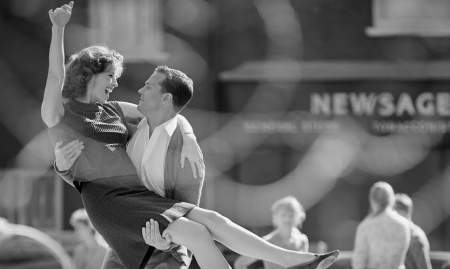
1. BELFAST
Film directors have been exploring their own childhood memories on screen for as long as the movies have existed, and the honor roll of notable films that have come from that exploration ranges from Francois Truffaut's "The 400 Blows" to George Lucas' "American Graffiti," from Louis Malle's "Au Revoir les Enfants" to Cameron Crowe's "Almost Famous," Mike Mills' "20th Century Women" to Lee Isaac Chung's "Minari," from John Boorman's "Hope and Glory" to Alfonso Cuaron's "Roma." And this past year, writer-director-actor Kenneth Branagh decided to explore his childhood during The Troubles in Ireland, and to say that "Belfast" brings out the best in him would be an understatement. In fact, it's truly one of the most beautiful films of recent years and the best film of 2021.
Visually stunning, emotionally wrenching, and gloriously human, "Belfast" takes one short period from Branagh's life and finds in it a coming-of-age story, a portrait of a city fracturing in an instant and a profoundly moving lament for what's been lost during decades of strife in his homeland of Northern Ireland. And one might think that kind of story would be dark and depressing, but on the contrary, it's funny and joyful, and told beautifully through the eyes of a child. Though I didn't grow up in Ireland, I was thrust back into what it truly felt to be a child and making sense of a confusing world.
The film opens with panoramic, full-color shots of the city of Belfast today, but then it skims over a wall and into a black-and-white street scene from 1969, with kids playing and adults shouting in a scene of bustling life that seems too bustling and too perfect - the memory of 9-year-old Buddy (newcomer Jude Hill).
But then, with shocking suddenness, the street is filled with angry men shouting, breaking windows and blowing up cars; it's chaotic and confusing to Buddy, and so it is to us, too. There's no context, no explanation of the Northern Ireland riots of August 1969 - it's just Protestants trying to drive Catholics out of a community where, Buddy's dad insists, "There is no our side and their side in this neighborhood."
On one level, the film is about a family torn between staying in the home they know and fleeing for the sake of the kids. Jamie Dornan plays the father who is forced to travel to England on work for weeks at a time, Caitriona Balfe is the mother who raises the kids in his absence and never appears less than radiant in Buddy's eyes, and they're both absolutely excellent in their roles, particular Balfe who truly carries the deep emotion of this movie. Judi Dench and Ciaran Hinds play the grandparents with a quiet virtuosity that summons up a lifetime of shared history in the smallest gesture or the simplest line. And as Buddy, Hill not only looks like what you think Branagh probably looked like at that age, he's the most watchable person on the screen even when he's sharing it with so many accomplished actors.
The movie is constantly bursting with life, with jokes and threats and tragedy and comedy all mixed up together, just as life usually is - and it also bursts with a love for the movies themselves, as the family makes regular trips to the local cinema to see "Chitty Chitty Bang Bang" or "One Million Years B.C.,"where you can see just how a young Branagh got the inspiration to one day become a filmmaker himself.
When the family goes to the movies, the images we see on that screen are in full color, as if they somehow felt more vibrant than day-to-day life. But in truth, the black-and-white cinematography from Branagh's longtime D.P. Haris Zambarloukos is so rich and beautiful, and makes the time period feel even more lived in.
The film feels true in the way it must be exploring Branagh's memories of a tumultuous and confusing time, and the way it pays tribute to a vibrant community as that community is changed forever. It ends with one of the most beautifully rousing set pieces ever, a performance of "Everlasting Love" showing just how much love there is in this family, no matter where the future takes them. The film is a beautiful reminder of what great cinema can be, and how the most personal of film work can truly be the most universal.
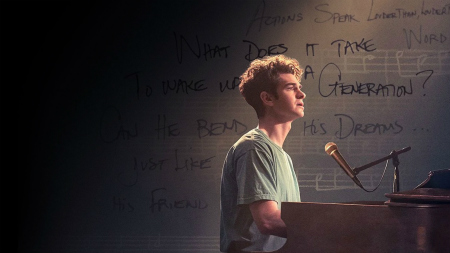
2. tick, tick ... BOOM!
Very few biopics about musicians or creative legends very rarely manage to get inside the minds of their subjects, to truly see how they create something. And also very often, these biopics don't give their subject the style of movie that matches who they were. But when a movie manages to do both of these things, it turns out as remarkable and magical as this truly joyous movie about Jonathan Larson, the brilliant lyricist and composer who eventually composed one of the greatest musicals of all time, "Rent." This movie was so good, it's really more a tie with my #1 movie of the year. And it also proved to me again what a genius Lin Manuel Miranda is, this being his debut as a film director.
The stage version of "Tick, Tick ... Boom!" was written by the late Jonathan Larson just before he started work on his classic, "Rent". It's a heavily autobiographical piece about a struggling musical theater writer in 1990 New York, trying to find the words and music that will connect with producers, audiences, and himself. He's been toiling away at a passion project called "Superbia" for the better part of a decade, a sci-fi sort of thing that is bristling with youthful passion but is perhaps too unwieldy in all its big swings. He's moving forward, but also stuck.
What is perhaps most remarkable about "Tick, Tick ... Boom!" is its wonderful sense of scale. This is a small movie about big things, not one that tries to amp up the musical grandeur to convince film audiences that something significant is happening. There is plenty of high sentiment and theatrical flourish, but Miranda renders even that with a disarming modesty.
Miranda brings to it all an enticing, heartwarming, and ferocious sincerity, portraying the kaleidoscopic whirl of incidents using flashbacks within flashbacks and depicting Jonathan's stories by means of the gleeful exaggerations of musical-fantasy sequences. The complexity of the storytelling is the movie's central delight; it's among the year's best-edited films.
Andrew Garfield gives his best performance to date playing Jonathan. His performance is a compassionate one, careful not to hide Larson's vainer side but also presenting him sympathetically. These contrasting characteristics come to a head in the emotive 'Why', a song that arrives during the film's big climax and which Garfield navigates without histrionics. It's a poignant, enjoyable final flourish.
For those familiar with the real-life story of Jonathan Larson, they'll know it's a devastating one. The composer passed away on the day of "Rent"'s first off-Broadway preview at the age of 35. Tragically, he never experienced his own success, but he always felt the ticking of every second, and how that clock was a constant enemy as he struggled for so long to get his creations out.
It's nostalgia, it's mourning, it's a reminder of the beautiful and complex place that is an artist's mind. It's the affirming knowledge that those minds are ever emerging, in even the darkest days, grasping to gather the world - or maybe just one corner of one city - into one pure and immortal thing.
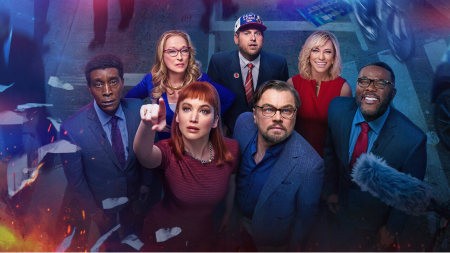
3. DON'T LOOK UP
Of all of the movies released in 2021, I still cannot understand how this film has garnered so many negative reviews, when this is one of the most clever and original films of the entire year. It's an unapologetically brash satire about a future America (although it really rings true to so much of what is wrong with America right now) so consumed with celebrity worship, brain-numbing infotainment, social media popularity, and political gamesmanship that it refuses to take the impending destruction of planet Earth seriously. We're not talking climate change here, though the parallel is obvious, especially with lead actor Leonardo DiCaprio involved. Dr. Randall Mindy (Leonardo DiCaprio) has irrefutable evidence that an unprecedentedly gigantic comet will wipe out Earth in precisely six months, 14 days. The chances of "planet extinction" are set at 99.78%.
Post-apocalyptic movies have always been around to caution viewers about the things we can lose if an extinction-level event happens and how we should mend our ways. While they're amazing in their own right, it's safe to say that the sense of optimism that humanity is going to survive an apocalypse is misplaced. Because we as a species aren't built to survive almost anything that's coming our way. Just look at how we dealt with the COVID pandemic. Now, for some reason, we've resorted to nihilism to cope with the inevitability of death because we don't know how to channel our fears and the people who we should hold accountable. And that's one of the reasons why a pre-apocalyptic movie like "Don't Look Up" is exactly what we need right now. I would dare argue it's the most timely movie of its moment that came out all year.
Writer-director Adam McKay, who has been making one incredibly sophisticated dark comedy after another lately such as "Vice" and "The Big Short", delivers another perfect addition to movies that have us laughing for all the wrong reasons while hopefully driving home some very important messages about what's wrong in the world today, whether it be the political world, the screwed up system of capitalism we have, or the impending doom of climate change.
And McKay once assembles a first rate cast all delivering stellar performances. Leonardo DiCaprio and Jennifer Lawrence are the main focus in this insanely stacked cast. They're vastly different in terms of characterization, initially. But it's funny to see their characters rub off on each other throughout the course of the movie and the finesse with which DiCaprio and Lawrence work that transition. Also, DiCaprio and Lawrence's freakouts are truly a work of art. They are famous for it because they do it in almost every movie. Yet, no two freakouts are the same. And they don't just scream loudly while contorting their faces. There's a certain level of nuance to it so that what they're saying pierces the screen and goes straight to your heart. Meryl Streep is fantastically annoying as a Trump like President. So is Jonah Hill. Their characters are truly punchable. Mark Rylance, as always, is brilliant. He doesn't appear scary at first glance. But he has a pretty spine-chilling moment made all the more creepy by his fake teeth. Cate Blanchett and Tyler Perry are adequately slimy. Rob Morgan is like a beacon of calm amidst this chaos. Truly brilliant casting choices all around.
But beyond politics, climate change, and global pandemics, what "Don't Look Up" also captures so brilliantly is the ways in which we all face death, or the prospect of death and its impending inevitability, particularly during its beautifully horrifying ending. Some despair, some accept it, some try to find a way to fight it, conquer it, defeat it, sometimes to the detriment of others, while others ignore it preferring to be distracted by entertainment, others deny it, or think that this could only happen to someone else, and refuse to acknowledge it. Or in the case of Leonardo DiCaprio and Jennifer Lawrence in this film, share one final dinner together with one of the best closing lines this film and honestly our world could have right now: "The thing of it is ... we really did have everything, didn't we? I mean, when you think about it."
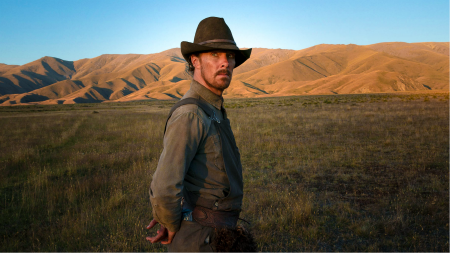
4. THE POWER OF THE DOG
Talk about a film that took me completely by surprise. I knew going into it that Jane Campion was directing an incredible cast, but that's about all I knew. By film's end, I had been surprising, complex journey that was so deeply nuanced unlike many films of recent times. Written and directed by Jane Campion, the film is breathtaking as it explores masculinity in its many forms, peeling back the layers by way of two very different men in the fading rancher life of the Old West. Based on Thomas Savage's novel of the same name, Campion's adaptation is unflinching in its depth and analysis, crafted with absolute perfection with craftspeople working at the absolute top of their game, and exceptional performances by every single actor.
Set in 1925 Montana, the story follows Phil (Benedict Cumberbatch) and George Burbank (Jesse Plemons), brothers who are wildly different in demeanor and outlook on life. Phil is a rancher by choice, embracing that way of life after being influenced by his late mentor Bronco Henry despite graduating top of his class. The financials and societal decorum he leaves in the hands of George. Unlike George, Phil is deeply cruel, gleefully pushing the buttons of others and bullying them to the point they fear speaking out against him. Enter Rose Gordon (Kirsten Dunst) and her son Peter (Kodi Smit-McPhee), who work at the restaurant in town. After Rose marries George and moves to the ranch, Phil takes joy in bothering her while eventually taking Peter, who Phil mocked heavily at first, under his wing.
There is a sequence where Phil contemplates his past relationship while George and his newlywed wife share an intimate moment in a room beside Phil's. We can hear the noise of moaning, while Phil comes to an emotional juncture which makes him escape. He couldn't face a communion of love, as he lost whom he loved the most. About 1 minute of close shot panning the face of Benedict Cumberbatch, as he displays an array of emotions, ranging from disgust to anger to sorrow to helplessness. This sequence itself is enough to ascertain that this film is a winner as far as writing, performances, and cinematography is concerned, then add in a haunting musical score by Jonny Greenwood which gets deep into the core of the narrative and keeps us unsettled. Ari Wegner photographs New Zealand with a sincere ardour about landscape and dust. Every single shot is top notch. Every single camera movement is to the point.
Cumberbatch has the best performance of his career playing Phil, and honestly I don't see how any other actor could have pulled off this performance, being able to portray such menace and vulnerability in the same character. No seismic events occur in "The Power of the Dog" ... there are no gun fights or cattle stampedes. Its meditative quality makes its abrupt ending feel even more sudden. The film is constantly building tension, both normal and uncomfortably sexual. There's a strange and subtle way the film presents this. It's all in the shots and score, making the film more and more intentionally uncomfortable as it goes along. It's a masterclass in creating and evolving tension.
This is one of those movies that invites rewatching, and Campion is one of those directors who rewards careful viewing. This psychological Western's themes of isolation and toxic masculinity are an ever-tightening lasso of seemingly innocuous events, and they import more horror and meaning on every closer inspection, corralling viewers under an unforgettable spell.
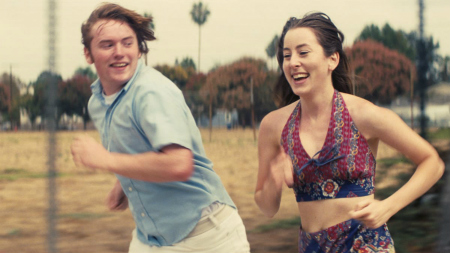
5. LICORICE PIZZA
The arrival of a new film by Paul Thomas Anderson always brings such wonderful anticipation, as some of his films have become some of the greatest ever made. And even the few times he has missed the mark, he is still one of the most original and exciting directors around, and his films are never ones that can be easily dismissed.
This time around, he not only delivered another exceptional film, but gives us one his funniest and joyful films yet. The story isn't that complex. Fifteen year-old entrepreneur Gary Valentine (Cooper Hoffman) falls for his high school photographer Alana Kane (Alana Haim) who makes it clear to him in no uncertain terms that they can be friends but nothing more. Instead, they go into business together to get in on the ground floor of the waterbed and then the pinball machine crazes, just as a fuel shortage and an election campaign hit the San Fernando Valley. Incredibly, both Alana Haim and Cooper Hoffman make their film debuts here, and they make it all look so easy. Their weird, warm chemistry and boundless energy keeps Licorice Pizza alive, and Haim in particular is an absolute revelation, giving one of the most lived in and honest performances of recent years.
One of the things that Anderson is so adept at doing is bringing us back to a time period with such beautiful attention to detail, making us feel we are truly reliving that time period as if the movie was made in that decade. In a lot of ways, this film reminded me of his earlier classic "Boogie Nights." Like that film, this is a tableau of 1970s Los Angeles. It's a version of reality that references real events and famous people who were around at the time but tweaks them to more snugly fit the story Anderson is trying to tell (this is especially true for Bradley Cooper's wonderfully unhinged performance). The cheeky self-awareness of aspects of the film's construction is made the most explicit by the fact that the entire Haim family (the band are friends and frequent collaborators with the director) appear as versions of themselves, offering fans of their music both a chance to sit in on their traditional Jewish family dinner and to see Alana telling both of her older sisters to "fuck off".
This has to be up there with the most evocative and moving portrayals of growing into the person you will be for the rest of your life, a huge subject approached largely through visual storytelling. And much like this time period in all our lives, we get focused on one thing for a little while and then quickly move on to something else, and sometimes find our way back. The narrative of this film follows that same style, forcing us to let go of our standard ways we want to accept a film's narrative and remember what it was like to be this young with our whole lives ahead of us.
"Licorice Pizza" is big-hearted and soulful, an uplifting coming-of-age quasi-romance that makes for a fascinating look at aimless young adulthood. Ease into the film's unhurried pacing and delightful teenage flights of fancy and you might find yourself compelled to start running, in a tracking shot, towards a brighter future.
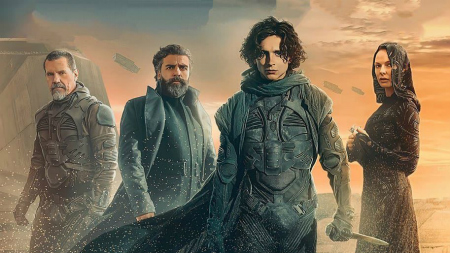
6. DUNE
It's probably the one book I've most wanted to read for years but somehow never have. When I relied on the movies to bring me the experience of "Dune", the results had been disappointing. But when I heard that Denis Villeneuve was going to tackle adapting this difficult novel to the screen, I could almost guarantee that it was going to be a success. And what a success it was.
The world of Frank Herbert's novel feels big and immersive here in a way it never has on-screen, with its futuristic spacecraft, cavernous fortresses and, of course, terrifying sand worms. The best decision Villeneuve made was to split "Dune" into two movies, demonstrating that he clearly is the one to make this legendary "unfilmable" book indeed filmable.
So much of Herbert's novel has become part of the fabric of popular science fiction that at times Villeneuve's film may seem deceptively derivative. Whether it's the samurai-style swordplay and inner voices of "Star Wars" or the Matrix-like question of Paul's foretold divinity, many themes can feel familiar. What makes them new is Villeneuve's astonishing visual sensibility. From ornithopters that flit like dragonflies to vast spaceships that glint in the mist and to the giant sandworms that no longer look silly, these are the kind of sights that truly great science fiction movies are made of. Experiencing the film in Imax is a wonder of even greater riches, enveloped by such beautiful imagery, the booming sound design, and the truly remarkable score by legendary composer Hans Zimmer. That this film was one of the best movies of this year was almost more for the experience of it which truly can't be captured watching it at home.
"Dreams make good stories," says Jason Momoa's Duncan Idaho, "but everything important happens when we're awake." That's a line that strikes a chord in a film that, for all its unearthly vistas, still manages to make a surprising amount of sense. It'll be quite some time before Villeneuve brings us "Dune: Part II", but if it's anything like this film, I cannot wait for how great it will be.
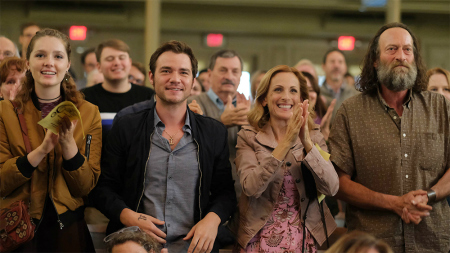
7. CODA
As one of the 2021's movies that so many had people had been talking about all year long (ever since Sundance), I had heard a lot about it, but never did see it until I was catching up on films and it ended up being the last 2021 movie we saw. And from the moment it started to its beautiful ending, I was absolutely in love with it.
The title of the film "CODA" is an acronym for child of deaf adults. Here it refers to a teenager named Ruby, played by a terrific Emilia Jones, who's the only hearing member of her close-knit family. They run a fishing business in Gloucester, Mass., and Ruby spends a lot of time helping out, joining the family on the water every morning before school and serving as their interpreter. Ruby is also a talented singer and wants to attend music school in Boston, but she worries that her family might not be able to get by without her and that they'll never understand her love for music.
Writer-director Sian Heder takes great care to increase and improve the long-overdue representation of the deaf community on screen, casting deaf actors in deaf roles (a responsibility the original film neglected). Like one of the best films of 2020, "Sound of Metal," "Coda" also makes brilliant use of sound, including the lack thereof, to illustrate the hurdles associated with being deaf in a hearing world, especially during a sequence where Ruby is singing on stage, and the sound drowns out completely so we can experience what her family is, having to look at the reactions of other people in the crowd to see how wonderful a singer Ruby is.
What could feel cliched at various turns deftly avoids that, capturing Ruby's plight in a way that recalls any number of coming-of-age stories while still feeling unexpectedly fresh and distinctive. And by conveying the story of parents who are physically unable to believe that their daughter truly has a gift, how resounding it becomes as a parallel to so many children whose parents CAN actually experience their child's talents but still don't support or foster them.
As the film evolves and leans further into the patterns of the genre, that seeming familiarity becomes one of its greatest assets. You may think you know this story, and you probably do. But you've never quite seen it like this, with these characters, and with this kind of care paid to an underrepresented portion of the population. In fitting so neatly inside expectations, Heder makes a sterling argument for more films like it - which is to say, movies that focus on under-served characters and performers that still contain massive appeal for everyone. It's a crowd-pleaser that works its formula well, even as it breaks new ground. The result is a powerful, probing exploration of familial bonds that isn't narratively groundbreaking, but speaks to the special power at work in this remarkably beautiful film. It may look recognizable, but Heder and her formidable cast and compelling emotion make sure it doesn't sound like anything else out there.
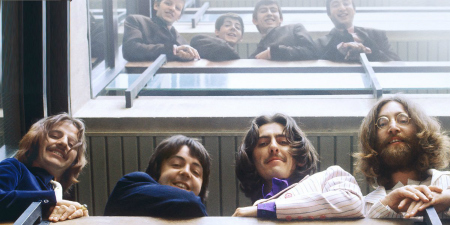
8. THE BEATLES: GET BACK
The talent and adventurousness of Paul McCartney, John Lennon, Ringo Starr, and George Harrison are well documented, the subject of a nearly 60-year examination of official and unofficial Beatles stories. Every inch of the legacy has been thoroughly considered, every strength and weakness detailed. It is strange, then, that director Peter Jackson's "The Beatles: Get Back", a three-part, eight-hour documentary culled from the dozens of hours of footage and audio recorded as the band worked on the songs released in the 1970 film and album "Let It Be", feels positively full of fresh insights into the inner workings of one of the greatest rock-and-roll bands of all time. We think we know the story of the period in which the Beatles drafted their final recordings, staged their final live show, and ultimately broke up. We've heard that Yoko Ono's presence in the sessions created static, that McCartney could be a taskmaster when he wanted, that Lennon and McCartney's egos marginalized Harrison's contributions. Some of this is true, but the footage tells a slightly different story: one of simple drift setting in between friends and of this last-ditch effort to fight back against the currents pushing the foursome in different directions.
Really, "Get Back" is a show about process and compromise, and the difficult nature of creativity and the value of an edifying work-life balance. Sometimes - more often than not - great work takes time, and inspiration won't show until the distractions in your periphery are sufficiently quieted. There is just no predicting what will happen when you sit down to create, no telling what you're in for.
Watching the Beatles work throughout this stunning documentary is an extraordinary gift into creativity, art, and music. They're brilliant writers, performers, interpreters, and musicians, and the three weeks in the weeds depicted in "Get Back" showcases this and more. We get heaps of McCartney's professorial grasp on music history, as much from spectating the spontaneous creation of classic songs like "Get Back" and "Let It Be", almost falling into it with very little effort before we even realize we're watching the creation of absolutely classic music.
Letting the footage do the talking here sets "Get Back" apart from a majority of modern films about music, which employ critical narratives to augment archival performances and interviews. Jackson trusts the footage as a corrective to the long-standing view of "Let It Be" as an acrimonious and trying time for the Beatles and leans into the fact that most who'll watch "Get Back" will be aware of at least some of the most important details about this band.
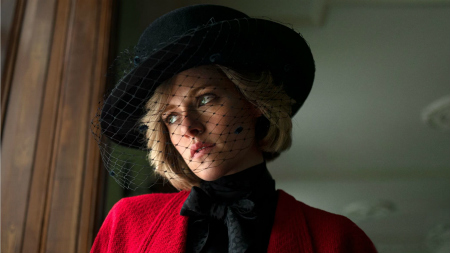
9. SPENCER
Chilean director Pablo Larrain's remarkable film about Princess Diana avoids the traditional biopic structure by looking at an imagined few days in Diana's film instead of trying to capture years of her story. Titles explain the story as "a fable from a true tragedy," which gives the film a fatalistic quality, which in many ways we already bring to it knowing the tragic ending of Diana's life. The screenplay by Steven Knight begins on Christmas Eve and ends on Boxing Day, though the drama is neither festive nor jolly. The story unfolds around Sandringham House, a 600-acre estate in Norfolk (called a "country house" by the royal family). Inside, a whole contingent of the royal family demands adherence to tradition at nearly every step. The chilly old residence also contains ghosts - Diana's tortured mind overflows with memories of a freer childhood and the looming presence of Anne Boleyn. Kristen Stewart stars as the late Princess of Wales, whose maiden name lends the film its title, giving a truly astonishing performance which was truly one of the greatest of the year. She gives an edge to Diana that truly makes her feel, more than any other portrayal of her has ever done.
"Past and present are the same thing," Diana tells her young sons of this coldly traditional world, in which a secret candlelit cuddle provides a rare moment of warmth, adding that in this house there is "no future". Little surprise that Diana longs to return "home" to nearby Park House, a childhood memory now sealed off behind barbed wire, eerily shrouded in moonlight and mist. Despite being ordered to stay away, Diana slips away to revisit old haunts in a scene that plays like a horror film, and a horror film is in many ways what we're watching.
Underpinning it all is a magnificent score by Jonny Greenwood that brilliantly accompanies and amplifies the drama. From the stunning motifs of the main theme, with its powerful strains of melanchol, to the sounds of a baroque string quartet collapsing into jarring terror, or the skittery free-form jazz of Diana's inner turmoil, the mood changes are remarkable.
I can't say enough about how remarkable Kristen Stewart is in this portrayal. She poured everything that she had into this role which in all honesty is already enough of a reason to see this film. Stewart squeezes out every inch from the character and is able to creatively display a brilliant characterization for Princess Diana - one that goes beyond the surface level of what people know about her. There is so much repressed pain that is seen throughout the film that the actress masterfully captures to the point that viewers are drawn and captivated with so much empathy for her.
History has dictated Diana's tragic legacy, however, there is something triumphant about this film's ending. In this pinpoint in time, she is a woman who escaped, and the possibilities, however brief, are endless.
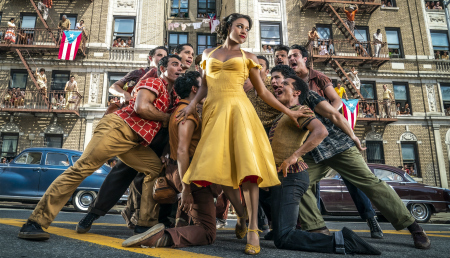
10. WEST SIDE STORY
When I first heard that Steven Spielberg was going to film a remake of the Oscar winning Best Picture "West Side Story", my first thoughts were "why"? But then I learned that he grew up with the original musical and it was his favorite musical ever. And he took it as a challenge to make a "West Side Story" not as a remake of the 1961 film, but of the original stage musical. And then I sat in a theater to experience Spielberg's "West Side Story" ... and I couldn't stop smiling the entire movie. It's a film so steeped in our love of movies by one of cinema's most legendary film directors, and it's impossible not to love every square inch of its many frames.
In the decades since it first appeared on Broadway in 1957, the Romeo and Juliet-inspired story of two warring New York street gangs has generated more than its share of criticism, especially over the writing and the casting of its Puerto Rican characters. Even the beloved 1961 movie inspires groans now for having cast Natalie Wood in the lead role of Maria, and for forcing Rita Moreno, the only Puerto Rican in the cast, to wear dark brown makeup as Anita.
Sixty years later, Moreno is an executive producer on Spielberg's "West Side Story". She also gives a poignant performance in the new role of Valentina, the widow of Doc, the drugstore owner. By her presence, Moreno teaches us how to approach this movie, as both an affectionate tribute and a gentle corrective. Spielberg and his regular screenwriter of late, the playwright Tony Kushner, give us a tougher, grimier vision of the Upper West Side in the 1950s. Adding to the realism is the fact that the Sharks are played by actors of Latino descent. They include David Alvarez as Bernardo, the brash leader of the Sharks, and Ariana DeBose as his girlfriend, Anita. Both actors are superb, as is Rachel Zegler, making an incredible screen debut as Bernardo's little sister, Maria.
The story hasn't changed: Maria falls into an ill-fated romance with Tony, a former member of the Jets, played by Ansel Elgort. Early in the film, the two meet surreptitiously on Maria's fire escape, singing "Tonight," one of the many classic Leonard Bernstein-Stephen Sondheim songs gloriously revived in the movie.
What's remarkable about this and the other numbers is how brilliantly Spielberg directs them. "West Side Story" is the first musical he's ever made, but it's no surprise that he's a natural at it: Few other American filmmakers have a more instinctive sense of rhythm and visual flow, or more direct access to your emotions. Spielberg stages the numbers like an old-school Hollywood classicist, with none of the overly jumpy editing that might distract from the dancing. When the Jets and the Sharks meet up at a school dance, their clashing tempers and bodies pull you in with an almost physical force. And when Anita and Bernardo sing "America," their rousing song about the pleasures and perils of assimilation, the scene builds from a domestic squabble to a joyous party in the streets, which Spielberg shoots in a vibrant whirl of color and movement.
Spielberg can't solve everything that's creaky and dated about "West Side Story" as a text. But he knows that the show still has something resonant to say about racism and violence in any era, including ours. The reason the movie works so well stems, I think, from a curious paradox: This "West Side Story" may be grittier and more realistic than the original movie, but it also feels more thrillingly old-fashioned than anything a Hollywood studio has released in ages.
By the end, I wasn't moved so much by Tony and Maria's sweet, somewhat drippy romance or the fatalistic drama between the Jets and the Sharks. I was moved by Spielberg's conviction, his sheer faith in the transporting power of movies. And for two-and-a-half hours, he makes you remember again why the movies are so extraordinary.
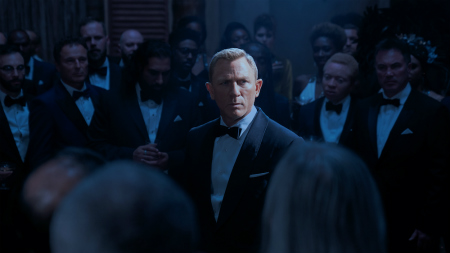
11. NO TIME TO DIE
I may have grown up with Roger Moore as James Bond and always believed Sean Connery to be the best, but Daniel Craig has completely been MY James Bond. I've never enjoyed and gotten more deeply into the psyche and potential of James Bond as a character like I did with Craig's remarkable five films which ended in 2021 with this hugely entertaining final entry which dared to take risks with the character, but was so completely in line with the risks this franchise took casting Craig in the first place. His James Bond will definitely be missed.
Packed with familiar faces but shepherded by some shrewdly chosen newcomers, "No Time to Die" packs a quintessentially Bond punch while also taking huge risks with the aging character and decades-old formula. Every Bond film markets itself as a fresh twist, but "No Time to Die" truly stands alone in the series at how just how far it goes. It's so un-Bond at times it's almost anti-Bond. These creative choices may be divisive, but you've got to hand it to the filmmakers for thinking big and bold.
"No Time to Die" includes Bond movie staples like gravity-defying car chases, ridiculous doomsday weapons, and vast brutalist hideouts full of henchmen with silly facial tics to mow down. And it continues the many through-lines from "Skyfall" and "Spectre". But at the same time, "No Time to Die" revels in blasting canon out of a cannon. You can feel an energetic freedom running through the film, a righteous urge to throw everything at the wall. We all know there's a reset coming when the role is recast at some unspecified point in the future, so for now the gloves are well and truly off, and the filmmakers truly have fun with it.
What this means is that Bond can truly change. This unconstrained Bond can be romantic, playful -- hell, even a bit camp. At times he's practically goofing around. Then he's deeply vulnerable. Then he's back to business. There's more than a holster under the tailoring, there's a rounded human being, which earlier installments of Bond never even bothered to get close to. It made his Bond films more than just action entertainments, they were truly movies with great depth and a truly wonderful performance throughout by Daniel Craig.
It remains to be seen what comes next after "No Time to Die" has so comprehensively blown up the franchise formula. Whoever takes on the role after Craig has a very big bow tie to fill. But a new bar has been set for the series, with Craig going out in incendiary style. It may not be true any more that nobody does it better, but Bond still does it pretty damn well.
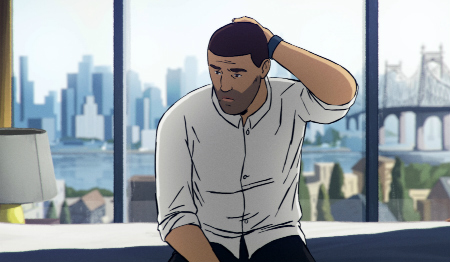
12. FLEE
Documentary realism rarely goes hand-in-hand with animation, but in Jonas Poher Rasmussen's "Flee", those two worlds collide in absolutely stunning ways, creating one of the most jarring film experiences of the year. The film follows Rasmussen's long-time friend Amin Nawabi - a pseudonym to protect his identity - via interviews about his secretive escape from war-torn Kabul in the 1980s, his perilous refugee journey through several countries, and his life as a gay Muslim man who, one way or another, has to hide some part of himself. In a mere 90 minutes, the film plunges the audience into the depths of refugee trauma and the systems set in place to strip people of their dignity, but it also builds to moments of stunning euphoria, and to a moving, deeply considered understanding of the way Nawabi has had to compartmentalize his soul. Eventually, he makes stunning confessions to his friend Rasmussen, about his family and their whereabouts, which he has revealed to no one - not even his long-term boyfriend - for the nearly two decades he's lived in Denmark.
His journey takes years, and it breaks up his family bit by bit, as they're forced to navigate cruel and expensive traffickers and corrupt local authorities in several countries, who are hell-bent on using ghoulish immigration laws against them. Some of this quiet barbarism is downright nauseating, not because physical cruelty is overtly depicted, but because of how the film captures and magnifies its depressing impact, turning people, once again, into shaded sketches, where their humanity becomes lost. At their most monstrous, these events - as recalled by Nawabi - even lead to the animation becoming disintegrated and abstract as he migrates from region to region, as if he were unable to find any semblance of belonging, or permanence, or solid ground.
The animation is both an aesthetic choice and a practical one. Some of it simply helps protect the identity of some of the film's refugees or the people who came to their aid, but there's much more than that. Most of the events Amin describes could never have been caught on film; giving the audience even an artful glimpse of these events makes them hit that much harder. One unforgettable sequence involves a boat full of refugees, including Amin, attempting to cross the Gulf of Finland and running into trouble. A cruise ship appears on the horizon and the refugees begin to cheer, assuming the ship full of wealthy tourists will certainly rescue them. But their cheers turn to horror when the tourists stand coolly on the deck, taking pictures of the people in the boats. An announcement comes: The Estonian police have been alerted, and the refugees will be collected and returned to Moscow. It's devastating. And it wouldn't have the same impact in a fictionalized tale, or if the scene was rendered as a reenactment or simply Amin talking to the camera.
There's a deep meaning to Amin's story beyond the specific facts of his life. All over the world, people are forced to flee their homes. If they're very lucky, they might resettle in a place where they'll be able to live some kind of better life. But that doesn't mean the trauma subsides. By the end, it seems telling his story - saying it out loud in a safe space, at last - may have helped Amin heal a bit more. Perhaps sharing it with audiences opens the same space for others, too.
An unfortunately timely film, "Flee" uses animation primarily to sharpen the dangerous edges of its refugee story, and to capture the devastating physical and emotional toll of never-ending war. But in brief moments, the film acts as a spiritual balm, offering hints and possibilities of a world where Nawabi might one day be able to fully share himself with other people. Where he might one day feel whole.
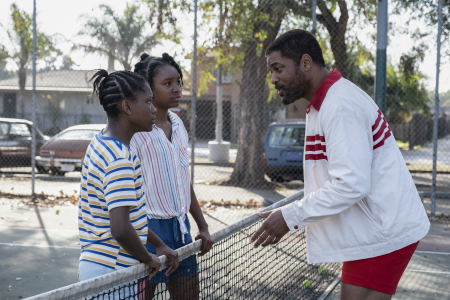
13. KING RICHARD
Will Smith has been acting for decades, but I don't think I've seen a more deeply layered and lived in performance from him than he did playing the enigmatic father of tennis legends Venus and Serena Williams in this very strong film. As someone who follows tennis a great deal, I've been very familiar with the rise of Venus and Serena and have so loved watching them play and succeed, but I didn't know as much about their upbringing and particularly how Richard Williams groomed them with singular vision to be two of the greatest sports figures that all of sports, not just tennis, have ever known.
The real pleasure of this film is seeing what Richards does next. It's absolutely compelling, not to mention how great it is to watch two champions rise to power. Richard Williams is indomitable, and it's fun to see that narrative play out, and witness how he tries to get every possible edge when it comes to lifting up his girls. Venus (Saniyya Sidney) and Serena (Demi Singleton) are captivating too, and seeing them roll with the punches is just plain fun to watch.
Even so, the film doesn't entirely shy away from the more difficult aspects of Williams's personality. Smith is excellent, fully inhabiting the character in one of the only roles to date that has required him to fully shed the usual Will Smith charm. Williams's personality is angular and uncomfortable, shaped by poverty, violence, and discrimination. Of course he was never going to be an easy fit within the rarefied circles of the tennis elite. Smith is matched by Aunjanue Ellis, playing wife and mother Oracene Price with warmth and dignity.
"King Richard" might move quickly from a pacing perspective, but it isn't afraid to linger on some family moments that give it a lot of authenticity. That's important, because films can quickly dial up the melodrama: but in the case of the Williams family, it feels like we're actually getting an account of their life. Everyone who plays a family member is up to the task, to the point where it doesn't feel like a typical "sports biopic," but something that feels a lot different, something really authentic.
"I'm in the champion-raising business," Richard boasts. The movie itself is in the very entertaining film business-the truly inspirational kind.
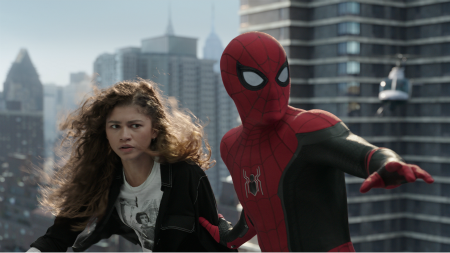
14. SPIDER-MAN: NO WAY HOME
There's no way to properly discuss this movie without talking about spoilers, so fair warning now. And honestly, as it has since become one of the biggest movies EVER at the boxoffice (pretty amazing even during a continued pandemic), who hasn't seen this movie yet? As Tom Holland has become the third actor to take on the role of Spider-Man (and the one who was incorporated into the Marvel Cinematic Universe when it finally came together), I couldn't help but always think back on the Tobey Maguire Spider-Man that I had so thoroughly enjoyed. I never did see the Andrew Garfield Spider-Man movies, most likely because I felt had had enough of Spider-Man after three films with Tobey Maguire and wasn't ready for another interpretation. I found my way back to the character through the Marvel Cinematic Universe, and then came this remarkable achievement.
Finding a way to integrate all three actors who played Spider-Man not only created such immense nostalgia and a thoroughly engrossing film, it also became one of the most intelligent and thought out superhero movies ever. Before this, I hadn't really been a fan of the first two stand alone Tom Holland Spider-Man movies, but this one became not only one of the best Spider-Man movies ever, but also one of the most joyful experiences I had in a movie theater this year.
Basically, this is the Tom Holland Spider-Man movie that feels most like the previous Tobey Maguire and Andrew Garfield installments, and that's probably why I liked it so much. Director Jon Watts deals with real consequences, a darker tone in general, and a recognizable New York setting (with a few Marvel Cinematic Universe touches of course).
We find Peter Parker at the beginning of this film dealing with the ramifications of the previous film, where everyone now knowing that he is indeed the man behind the Spidey costume. Finding his life so difficult now, he goes to Doctor Strange (in another wonderful performance by Benedict Cumberbatch), asking him to cast a spell to cause the world to forget who he really is. This spell opens multiple universes, and what follows is a surprising, expectations-toying spectacle with a deeper thematic heft than I was expecting.
Initially, we just thought this would be bringing back villains from the previous Spider-Man films, and these are also done brilliantly with wonderful performances by Willem Dafoe, Jamie Foxx, and in particular Alfred Molina. Thanks to Marvel's digital de-aging technology, Dafoe and Molina mostly look like they did nearly two decades ago when they appeared in Sam Raimi's original Spider-Man trilogy.
The action scenes, featuring hand-to-hand combat, feel more practical and visceral. Grittier, sweatier, bloodier. A first-person perspective straps you in for a dizzying ride with Spider-Man swinging from A to B. Small details, such as Peter using his webs to grab things around Aunt May's apartment, add welcome charm and color. This time, Peter also exercises his Spidey senses, so that the often-joked-about "Peter tingle" is now a real asset -- one that we can finally feel too, via sound effects and a close-up on Holland's face.
Holland also gets to showcase his dramatic acting talents much more than any other Marvel film. The darker material pushes Holland to burning, emotional places, and it truly makes an impact. Special mentions also go to Zendaya and Jacob Batalon (Peter's best friend, Ned), their performances are stellar here.
"No Way Home" is, if you step back and think about it, a truly weird yet audacious movie. Yet as crazy-meta as the narrative gets, it always keeps its characters up front, with some dynamic and, at times, truly heart-warming interplay between the established players and their interdimensional guests. It deals with themes of second chances which were truly moving, and it's refreshing to see a blockbuster movie these days that is actually original and thoughtful.
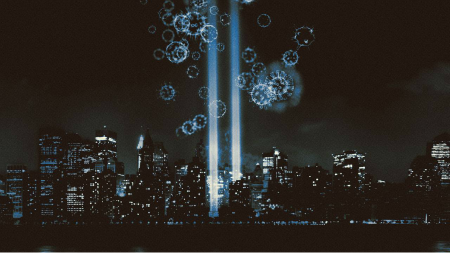
15. NYC EPICENTERS: 9/11 - 2021 1/2
Spike Lee has not only firmly established himself as one of our greatest and most important living film directors, but also as one of our greatest documentarians as well. And as a New Yorker, he has also continued to demonstrate his absolute love for the city, and never more so than he did in this sprawling eight hour documentary which presented so many important struggles that New York City has endured from 9/11 to the present day. Not always downbeat and serious, it's a heartfelt love letter to the vibrancy and resilience of New York City. Lee's documentary focuses on two of the major tragedies New York has experienced over the last two decades: Covid-19 and 9/11.
Whatever his subject, Lee positions himself more as a listener than an investigator. He interviews emergency workers, bereaved survivors, celebrities, and politicians with the same empathetic enthusiasm, sometimes leaping in to repeat a particularly telling quote or to talk about sports. It makes for engaging interviews that are more like conversations we're listening in on. This interview style elicits many powerful and emotional responses, while also making many sobering points which definitely hit home. And while the series is New York City to its very core and only occasionally visits stories in other parts of America, the people we meet and the stories they tell and the hardships they endure and the battles they fight are relatable to the rest of the country and most of the world.
Episode 1 is largely about the onset of the pandemic, as politicians, healthcare workers, patients and journalists recall the early days of uncertainty followed by the months and months of tragedy. Every time new interview subjects are introduced, they introduce themselves on camera, even as they are identified with text on the screen as well. I found that style very impactful to personalize every interview even more. Virtually every interview provides a new perspective of some kind, and throughout, Lee provides some of his own opinions as well. When Trump is onscreen for example, the graphic refers to him as "President Agent Orange." (which I did laugh at each time).
"Epicenters" eventually expands into lengthy treatments of the Black Lives Matter movement, the marches and rallies and conflicts across the United States in the summer of 2020, the dangerous spread of misinformation about COVID and the vaccines, and the mob attack on the U.S. Capitol of Jan. 6. The third and fourth installments are pretty much all focused on 9/11. It was so powerful to see footage of the World Trade Center towers being built as a preview right before being plunged into the nightmare of 9/11. And even though I had thought I had seen and learned about every aspect of 9/11, there was one segment which was completely new to me: the maritime evacuation of more than a half million people from lower Manhattan by a convoy of Coast Guard vessels, New York police department harbor unit boats and ships, fireboats, merchant ships, tugboats, and civilian ferries.
Through it all, Spike Lee's lifelong love affair with New York City and its people is fierce and unwavering, which makes this one of the most engaging and entertaining documentaries of recent times.
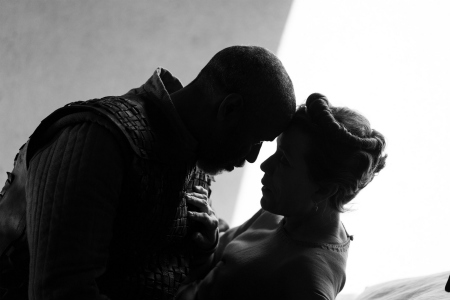
16. THE TRAGEDY OF MACBETH
There have been so many film adaptations it seems of nearly every William Shakespeare play, so I'm always fascinated to see how new filmmakers find a reason to justify a new film interpretation. And in the case of director Joel Coen, he found many stunning reasons to give us yet another interpretation of MacBeth on screen, primarily through the remarkable casting of Denzel Washington and Frances McDormand, but also in the stunningly gorgeous black and white cinematography of Bruno Delbonnel. Not only that, presenting the story in the incredibly sparse stages and production design by Stefan Dechant.
Coen and his cinematographer evoke the look of older movies with a spectral black-and-white palette and a nearly square frame. Carter Burwell's score sets an ominous mood, complemented by what sounds like an executioner's drumbeats. It's an immaculate piece of craftsmanship by artists working at the top of their game; the very look and feel of the movie cast a spell.
The tormented souls played by Washington and McDormand, and it's fascinating to watch two of our most famous actors step out of this movie's expressionist shadows. They are somewhat older than most actors cast as Macbeth and Lady Macbeth, which contributes to an even greater sense of futility to their deadly plot against the king, Duncan, while he's a guest in their home. This Macbeth's reign of terror is destined to be short-lived.
Not much else has changed: Macbeth commits the murder and seizes power, setting in motion a brutal chain of violence. At one point he turns to the three old witches who first prophesied that he would become king. All three witches are played by the English stage actor Kathryn Hunter, whose brilliant performance, with its spooky intonations and contortionist gestures, give this movie its darkest magic.
But it's all of Coen's remarkable choices which create a film which is absolutely haunting yet beautiful to behold. What lingers in the mind after this version of "The Tragedy of Macbeth" is not specific line deliveries or bravura acting moments - although the cast is all universally brilliant - but images and sounds. The smear of blood on Macbeth's cheek. The circling crows. The fog out of which characters emerge. The ominous strings of Burwell's score. The dripping and knocking and pounding. These fragments remain, like the shards of a dream, one you're happy to have awakened from but also long to return to, so you can discover what profound discoveries lie within.
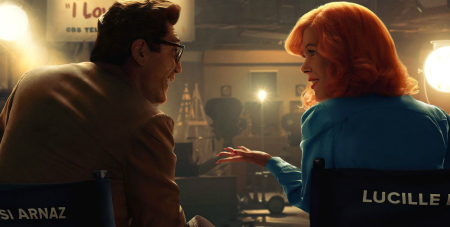
17. BEING THE RICARDOS
I have long been a fan of Aaron Sorkin. I think he still remains one of our most gifted and genius screenwriters, and his turns as a director have also been films I've come to love and admire. This one may not rank up there with Sorkin's best, but it's still a first rate film gifted by some incredible performances. Nicole Kidman is the one that most people talked about wondering if she was the best casting choice as Lucille Ball, but I also wish the credit would be given to Javier Bardem, and particularly J.K. Simmons and Nina Arienda, who all deliver stellar work here.
The entire movie takes place in one pressure-cooker week during the shooting of the CBS sitcom "I Love Lucy." It's 1952, the show is in its second season, and it's the most popular program in America, with 60 million viewers every week. It's also a revolutionary show: the first to use the three-camera system that would allow sitcoms, going forward, to be filmed live; and also a mainstream TV comedy about a cross-cultural marriage, starring two actors who, in playing Lucy and Ricky Ricardo, were (it was implied) portraying a stylized version of themselves.
Sorkin's script is complex but it's not complicated. He's got a lot of themes going on here: the shifting power-dynamics of a couple on and off screen; Hollywood misogyny; corporate hypocrisy (the show's sponsor won't allow Lucy's pregnancy to be mentioned on screen, because the implication of sex is obscene, but they'd love her to promote their cigarette brands); media manipulation; and much more. Very occasionally the volume of storylines slows the pace, but he largely keeps all this in balance by always staying centered on Lucy and Desi.
Everything that happens in "Being the Ricardos" really did happen. But it didn't happen in the same week, or anything close to it, but in compacting so many things the way that he did, I think the film is actually successful because of that. I truly loved how it was able to portray Lucy behind the scenes. the hurtling energy and anxiety that rides on everything Lucy is feeling. And what Lucy does is to take her own pent-up anxiety - over the Communist-accusation situation, but mostly over the possibility that Desi is an adulterer - and pour it into that week's episode of "I Love Lucy." She keeps taking over the set, directing more than the director does, tweaking the comedy bits, trying to make it all work better, trying to make it more ... authentic. We see her vision as a comic artist (and her attempt to seize the terrain of male power). But what she's also doing, on some level, is trying to make the Ricardos be what she wants her and Desi to be. She keeps asking: What would Lucy do? What would Lucy not do? What she's really asking is: What should Lucy do?
Off camera, the Lucy of "Being the Ricardos" keeps pushing the show to be better, and that means closer to something real. She was an entertainment visionary who, Sorkin suggests, was also trying to perfect her home away from home. She succeeded, maybe too well.
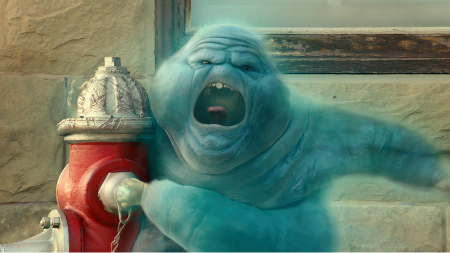
18. GHOSTBUSTERS: AFTERLIFE
I must admit I was very skeptical about the prospects of this film or the need for it, but once I was finally in the theater and watching it unfold, I couldn't help but admit that it was one of the most enjoyable film experiences I was having this year, and while ludicrous in many spots in its storytelling, if you just go with it, it rewards with some wonderful nostalgia reminding us why we loved that original "Ghostbusters" all those years ago in the 80's.
First and foremost, I thought "Ghostbusters: Afterlife" did an amazing job at creating a new movie for kids today to love, but also created something that was really special and nostalgic for original Ghostbuster fans, and that's no small feat to be able to do. The cast of youngsters in this film were all wonderful, especially Phoebe (Mckenna Grace) and Podcast (Logan Kim), who are an absolute delight to watch in this film. I think a lot of the success of this film comes from the fact that Jason Reitman directed, following after his father Ivan's original directing, which helps to provide the nostalgia and throwbacks to the original while also maintaining its own new identity.
Special effects have advanced light-years since 1984, and yet Reitman (the younger) makes the respectable decision to stick to the look of the original film, opting to use models and practical tricks where possible, but not ruling out CG where necessary. Some years back, there was talk of a possible "Ghostbusters 3," but then Harold Ramis died, leaving the team incomplete. "Afterlife" finds an emotional way to honor his legacy, using a combination of technology and creative screenwriting to make his character felt in the run-up to the movie's supernatural battle royale. In retrospect, there was only one right answer, and "Afterlife" nails it.
There's a whole lot of 80s nostalgia updates happening in films today (and even more to come), so it's refreshing when one actually tries to be something that honors what came before yet manages to strike through with something on its own that helps make that nostalgia even more fun to relive. The original "Ghostbusters" was a singular experience that will never be replicated. But "Afterlife" does take us back into a beloved world and offers the opportunity to hang out with old friends we thought we'd never see again. And if all this film did was create the brief segment where multiple little Stay Puft marshmallow men all went bonkers in a grocery store, it would still be one of the best films of the years. I want that segment on a continual repeat by the way.
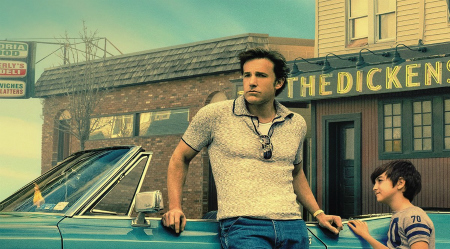
19. THE TENDER BAR
The title is definitely apt ... this is one of the most tender and simple films I've seen, and it oddly succeeded for me, mostly due to some truly remarkable performances, Ben Affleck in particular. In many ways, the film is rather uneventful, but that allows for an intimacy and a look at family dynamics that I feel so many people can find resonance with. Adapted from J.R. Moehringer's memoir by director George Clooney and screenwriter Bill Monahan, the film acknowledges how, growing up without a father, the young J.R. found the next best thing, if not better, in his blue-collar uncle Charlie. It was Charlie - bartender at a spot called The Dickens, where rows of thick hardback books lined the shelves behind the bar (I seriously want to go to a bar like this) - who encouraged J.R.'s early attempts at writing, and who taught the boy what it meant to be a man and how to respect women. When the time came, Charlie showed J.R. how to drive and served the young man his first drink.
There's a simple, undemanding honesty to this film. The emotions are small, the spaces are intimate. It feels minor, but not insignificant. I imagine Clooney sees some part of himself in Moehringer's story - many others will, too, even if it's only the soft pang of nostalgia. What Clooney and crew conjure so magnificently is the look, sound, and feel of a household that can only survive by sweeping trauma under the rug, busying itself with small trivialities. The performances have such an easy, lived-in quality that it wouldn't be fair to call it inauthentic.
One of the best aspects of the film - and the best thing about George Clooney's direction of it - is that with all the attention the boy gets from his harried but affectionate mother (Lily Rabe), his gruff grandfather (Christopher Lloyd) and his uncle, plus all the guys in the uncle's circle, it becomes clear that little J.R. (played very strongly by Daniel Ranieri) feels loved. These scenes could have been sentimental, but they're not. They're authentic to the experience of being a little kid growing up in the 1970s.
What "The Tender Bar" may lack in narrative, or even emotional urgency, it at least makes up for in the warm and uncompromised feeling of coming home. George Clooney directs the film like Scorsese on a slow day; side characters drift in and out, threads are inspected briefly and then discarded. To be fair, that is how life works; and that's what this film feels so authentically like.
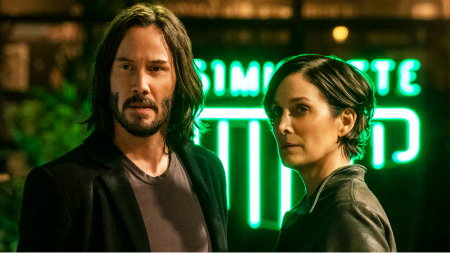
20. THE MATRIX RESURRECTIONS
Back in 1999, I and so many others were blown away by the incredible mind trip of a movie that "The Matrix" was, presenting ideas about existence which were fascinating and horrifying all at the same time. Then they had to make two sequels, and by the end of the third one, I found myself saying that I wished they hadn't made those sequels at all, because they just tainted what had been a truly special film experience with the original.
So then many many years go by, and I hear they're going to try to make another Matrix sequel. So I was definitely not expecting much when this fourth film arrived, but when it finally finished, I felt an excitement I hadn't really felt since the first film, and felt that director Lana Wachowski (working solo this time) had delivered the ending to the series that we actually deserved. When I mentioned in my summary of the year how much joy I experienced in this year's greatest movies, this was one of those examples, just pure joy in seeing a great Matrix film which could now play with even better visual effects, but did not neglect the ideas of the original like the other two sequels had mostly done.
What I loved the most about this new film was how it didn't pander to its fans like a lot of sequels tend to do. In fact, this film instead addresses the many and varied ways the original film has been adopted or co-opted. It pokes fun at over-earnest assertions that the film's symbolism and metaphors mean this or that, and exasperatedly rolls its eyes at those who've "missed the point" of the infamous red pill.
As a jaded and middle-age Neo suffers from being surrounded by people who can't stop talking at him about what The Matrix really means (brilliantly portraying him as a creator of a very popular Matrix video game), the opening scenes of the film play out what life must have been like these past two decades for Keanu Reeves, and particularly for the Wachowskis. If you've ever gone back to one of your favorite films from your youth and found it startlingly different seen through older (and hopefully wiser) eyes, you'll understand what Lana Wachowski must be going through. The first half of the film is surprisingly more about art under capitalism than it is a science fiction treatise on existence.
With wonderful new choices in casting from top to bottom, and two wonderful performances by Keanu Reeves and especially Carrie-Anne Moss, this film reminds us why the original worked so well and why the sequels missed the point. As the original trilogy expanded, "Resurrections" shrinks down tight to essentially a love story .. which is precisely where it needed to go.